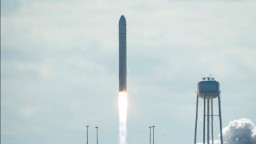

Story highlights
Orbital Sciences successfully launched its Cygnus cargo ship Wednesday
The unmanned craft is set to rendezvous with the International Space Station on Sunday
NASA has a $1.9 billion contract with Orbital for eight flights to the ISS
CNN
—
Orbital Sciences Corp. sent up its first entry into the space freight business Wednesday with the launch of a new unmanned cargo carrier to the International Space Station.
It’s the first flight for the company’s Cygnus spacecraft and the second for its Antares booster rocket. Liftoff was at 10:58 a.m. at NASA’s launch facility at Wallops Island, Virginia, about 90 miles north of Norfolk.
About 10 minutes after launch, a cheer went up in the company’s flight control room in Dulles, Virginia, outside Washington, when the craft separated from the second stage of the booster. Its solar arrays deployed successfully about 15 minutes later.
“The spacecraft is working really well right now,” Frank Culbertson, the head of Orbital’s advanced programs group and a former astronaut, told reporters after the launch.
Cygnus is slated to perform three days of tests before being cleared to approach the ISS and it’s scheduled to rendezvous with the space station until Sunday. The launch had been scheduled for Tuesday, but was postponed for a day because of bad weather and a technical glitch that delayed the craft’s roll-out on Friday, NASA said.
Unlike the SpaceX Dragon capsule, which is designed to be reused and eventually carry passengers, the can-shaped, 17-foot Cygnus is a one-shot craft that will burn up on re-entry after its flight to the space station. It carried about 1,500 pounds of cargo into orbit on Wednesday, but is capable of carrying up to 4,400 pounds (2,000 kilos), the company says.
After about a month, the craft will be packed with trash from the station and cut loose to burn up in the atmosphere, Culbertson said.
“It’s going to be an exciting and fascinating and interesting time for everybody involved,” he said.
NASA hired Orbital and SpaceX to start making cargo runs to the space station after retiring its fleet of space shuttles and turning much of its focus toward exploring deep into the solar system. Orbital has a $1.9 billion contract with NASA to make eight flights to the space station under the space agency’s commercial supply program.
“We look forward to the rendezvous with the station on Sunday, and with that we’ll have Orbital joining SpaceX as one of our providers,” NASA Associate Administrator Robert Lightfoot said.
SpaceX has so far made two of its 12 scheduled flights to the ISS under a $1.6 billion contract.
